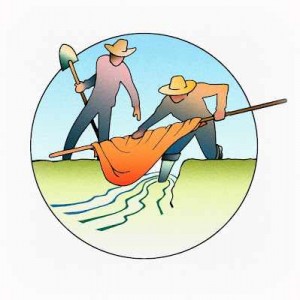On Acequias
Water, Place, Resilience, and Democracy
{Note: This post is a synthesis of select excerpts from work appearing in a chapter prepared for a forthcoming edited anthology, Voces de Agua: Culture, Place, and Nature in the Acequia Communities of the Upper Rio Grande Bioregion, 1598-2008. This article presents a summary of some of the principal  research findings of the path-breaking NEH Upper Rio Grande Hispano Farms study, the core of which was conducted in the field between 1995 and 1999. This massive research project, with more than $190,000 funding from the National Endowment for the Humanities and the Ford Foundation, produced the first comprehensive interdisciplinary and farmer-led study of acequia farms of the RÃo Arriba since the historic Tewa Basin Study of the 1930s; that sadly, is a testament to the neglect of acequia agroecosystems and communities by governmental and academic institutions. The twenty-four research scholars and farmers who collaborated in this major study developed some enduring innovations for integrated social and natural scientific research on Indo-Hispano agroecosystems that have left an enduring mark on the field. The NEH study played a significant role in the revival of acequia studies in the United States at a time when no one was really paying much attention to the study of Chicana/o farmers.} (more…)
research findings of the path-breaking NEH Upper Rio Grande Hispano Farms study, the core of which was conducted in the field between 1995 and 1999. This massive research project, with more than $190,000 funding from the National Endowment for the Humanities and the Ford Foundation, produced the first comprehensive interdisciplinary and farmer-led study of acequia farms of the RÃo Arriba since the historic Tewa Basin Study of the 1930s; that sadly, is a testament to the neglect of acequia agroecosystems and communities by governmental and academic institutions. The twenty-four research scholars and farmers who collaborated in this major study developed some enduring innovations for integrated social and natural scientific research on Indo-Hispano agroecosystems that have left an enduring mark on the field. The NEH study played a significant role in the revival of acequia studies in the United States at a time when no one was really paying much attention to the study of Chicana/o farmers.} (more…)
